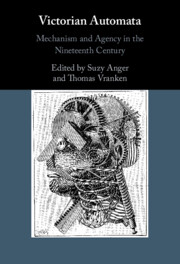Book contents
- Victorian Automata
- Victorian Automata
- Copyright page
- Contents
- Figures
- Contributors
- Introduction
- An Afterthought on Victorian Automata as Afterthought (and Signifier)
- Part I Mechanical Automata
- Part II Automatism
- Chapter 4 The Dialectic of Automatism and Free Will
- Chapter 5 The Poetry of Conscious Automatism
- Chapter 6 “No Purpose, Heart or Mind or Will”
- Chapter 7 Creative Trollope
- Chapter 8 Darwin and Agency – Intention or Automatism?
- Part III Literary Genre and Popular Fiction
- Part IV Interactions
- Index
Chapter 5 - The Poetry of Conscious Automatism
from Part II - Automatism
Published online by Cambridge University Press: 15 March 2024
- Victorian Automata
- Victorian Automata
- Copyright page
- Contents
- Figures
- Contributors
- Introduction
- An Afterthought on Victorian Automata as Afterthought (and Signifier)
- Part I Mechanical Automata
- Part II Automatism
- Chapter 4 The Dialectic of Automatism and Free Will
- Chapter 5 The Poetry of Conscious Automatism
- Chapter 6 “No Purpose, Heart or Mind or Will”
- Chapter 7 Creative Trollope
- Chapter 8 Darwin and Agency – Intention or Automatism?
- Part III Literary Genre and Popular Fiction
- Part IV Interactions
- Index
Summary
This chapter examines the conscious automata theory as advanced by Thomas Huxley in his controversial essay “On the Hypothesis that Animals are Automata, and its History” (1874), which posits that human consciousness is a mere byproduct of neural processes, not, as is widely thought, the initiator or controller of voluntary behavior. This chapter asks why a theory that denied the efficacy of consciousness strongly captured the Victorian cultural imagination, and considers the implications of the view for aesthetic production. It explores late nineteenth-century responses to conscious automatism in philosophy, psychology, literature, and popular culture, before looking more closely at the treatment of the ideas in Samuel Butler’s “Book of the Machines” and George Eliot’s “Shadows of the Coming Race,” alongside George Henry Lewes’s Physical Basis of Mind. The chapter argues that rather than diminishing consciousness, Huxley’s theory removes consciousness from science and hands it over to aesthetics and, especially, literary texts.
Keywords
- Type
- Chapter
- Information
- Victorian AutomataMechanism and Agency in the Nineteenth Century, pp. 107 - 131Publisher: Cambridge University PressPrint publication year: 2024



